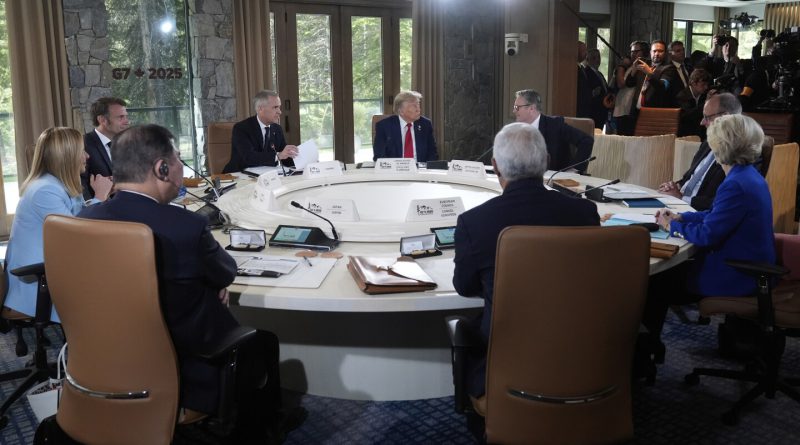G7 Backs Israel, Labels Iran as Middle East Destabilizer Amid Escalating Conflict
Toronto — The Group of Seven (G7) nations voiced strong support for Israel while squarely blaming Iran for regional instability. The G7 leaders issued a joint statement late Monday, urging immediate de-escalation amid fears of a broader war following the latest round of airstrikes exchanged between Israel and Iran.
The high-level statement came just days after Israel launched preemptive strikes on Iranian military installations—an operation it claims was aimed at preventing Tehran from advancing toward nuclear weapon capabilities. Iran responded with retaliatory attacks, triggering a new phase in the already volatile regional dynamics since the outbreak of the Gaza war in October 2023.
“We affirm that Israel has a right to defend itself. We reiterate our support for the security of Israel,” read the G7 communiqué, which also emphasized that “Iran is the principal source of regional instability and terror.”
The leaders of the G7—comprising the United States, United Kingdom, France, Germany, Italy, Canada, and Japan—also reiterated a critical demand: “Iran can never be allowed to possess a nuclear weapon.”
Rising Death Toll and Escalation Fears
The conflict has already resulted in tragic civilian casualties. Iranian sources report over 220 deaths, including women and children, while Israel has confirmed 24 civilian fatalities. Both sides have accused each other of targeting civilian infrastructure, heightening fears of further escalation.
On Monday, an Israeli airstrike reportedly targeted Iran’s state broadcaster headquarters, intensifying panic among Tehran’s residents. U.S. President Donald Trump, attending the G7 summit in Canada, abruptly announced his early departure to return to Washington, citing the urgent regional developments.
In a social media post, Trump warned: “Everyone should immediately evacuate Tehran.”
U.S. Stance: Awareness Without Involvement?
While the United States has publicly distanced itself from direct involvement in the Israeli operations, Trump admitted that Washington had prior knowledge of the strikes and called them “excellent.” Nevertheless, the U.S. has issued stern warnings to Iran not to retaliate against American personnel or assets stationed in the region.
U.S. Secretary of State Marco Rubio held a series of calls with foreign counterparts in Europe to coordinate diplomatic responses and assess regional fallout. Despite the heated tensions, Washington maintains that it still seeks a nuclear agreement with Iran—underscoring the fragile balance between deterrence and diplomacy.
Nuclear Standoff: Two Realities
Iran has long denied ambitions to build nuclear weapons, insisting its nuclear activities are for peaceful energy purposes as permitted under the Nuclear Non-Proliferation Treaty (NPT), to which it is a signatory.
In contrast, Israel—while not a party to the NPT—is widely believed to possess an undeclared nuclear arsenal. It neither confirms nor denies this status, maintaining a policy of strategic ambiguity.
Call for Regional De-escalation and Gaza Ceasefire
Beyond the immediate hostilities between Israel and Iran, the G7 emphasized the need for a broader ceasefire across the Middle East, including Gaza.
“We urge that the resolution of the Iranian crisis leads to a broader de-escalation of hostilities in the Middle East, including a ceasefire in Gaza,” the statement read.
The G7 also expressed readiness to collaborate in ensuring energy market stability, amid concerns that the conflict could disrupt global oil supply lines and inflate prices.
As tensions remain high, international observers warn that without swift and strategic diplomacy, the Israel-Iran showdown could spiral into a multi-front conflict with far-reaching global implications.



